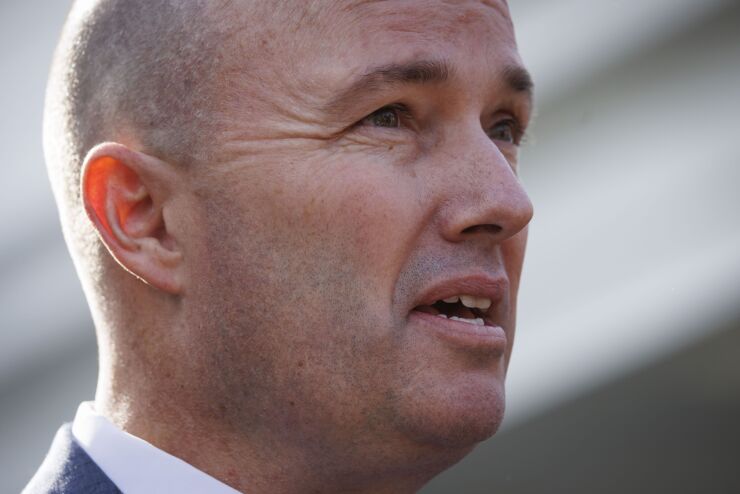Housing advocates in Dallas are pushing for a $200 million share of a $1.1 billion general obligation bond proposition city officials want to place on the ballot next year.
The city is becoming unaffordable, according to Bryan Tony, organizer of the
“Our argument is that Dallas has historically under invested in housing and that’s why we find ourselves in that situation that we’re in from an affordability standpoint,” he said.
Bloomberg News
Tony described the situation as Dallas having a mean income for residents of $58,200, an average home price of $405,000, and a shortage of over 16,000 single-family homes “for people who would want to buy a home, can afford to buy a home, and can’t find the inventory.”
In addition, Dallas is also short about 33,600 rental units for families earning less than 50% of the area’s median income, he said.
A community bond task force allocated only $25 million of bonds for housing, while $70 million recommended by city staff is currently under consideration. Both proposals earmarked the bulk of the proposed $1.1 billion of debt for streets, transportation, parks, and recreation. Dallas included $20 million of bonds for housing efforts in its $1.23 billion 2017 bond package and $22.5 million in a 2006 bond proposition.
Tony said the coalition is continuing to campaign for a bigger slice of the upcoming bond election that could be finalized by the city council as soon as February to make the May ballot.
“We might not get the full $200 million, but I think we’d like to fall anywhere from $100 (million) to $150 million,” he said.
High interest rates have battered the nation’s housing market with ballooning mortgage costs that have sidelined homeownership for many, while rent prices remain elevated.
“Since the beginning of the pandemic, rents have surged by a striking 29.4%,” Zillow’s November
The average U.S. home value was $346,048 as of Nov. 30, up 2.2% from 2022,
Housing problems can be exacerbated in Southwest states that have become migration magnets. In 2022, Texas topped

Issuance of housing revenue bonds hit the highest level in five years at $33.7 billion in 2023, according to LSEG data. The tax-exempt, private-activity debt is largely subject to federally mandated volume cap limits allocated to each state based on a formula.
Dallas issues tax-exempt revenue bonds through its Housing Finance Corporation for the acquisition, construction, or rehabilitation of multi-family housing for individuals and families earning 60% or less of the area’s median income.
Like Dallas, other Texas cities have also turned to GO bonds to fund affordable housing in recent years.
San Antonio won voter approval for $150 million of GO bonds for building, preserving, and rehabbing homes and rental units as part of a $1.2 billion debt package on the May 2022 ballot.
In Austin, where rising housing costs have contributed to a homelessness problem,
The city’s school district considered including about $50 million to fund affordable housing for teachers as part of its $2.44 billion bond package that voters approved in November 2022.
Instead, Austin Independent School District focused its efforts on repurposing underutilized school facilities and property for housing.
The district’s board created a public facility corporation in April and last month chose a developer
“We will be ground leasing the Coy site to The NRP Group, a housing developer that will be responsible at their sole cost to build, manage and operate the housing,” Jeremy Striffler, the district’s real estate director, said in an email.
In Utah, Gov. Spencer Cox made housing the centerpiece of the $29.5 billion fiscal 2025 budget he proposed this month.
“The single greatest threat to our future prosperity, the American Dream and our strong communities is the price of housing,” the Republican governor said in a statement. “Our kids will never be able to call Utah home if we don’t start building starter homes again.”
His budget for the fiscal year that begins July 1 would spend $150 million toward a goal of creating 35,000 starter homes by 2028. Another $45.5 million is earmarked for affordable housing and $193 million would fund a comprehensive statewide homeless support system.
“After months of analyzing our collective response to homeless services, we’re doing many things well, but we’ve also found gaps in the system,” Cox said.
Mike Johnston made homelessness and affordable housing top priorities in his successful bid to be Denver’s mayor. His platform included a plan to use about $50 million Denver expects annually under Proposition 123 to help fund 25,000 “permanently affordable” units within eight years.
The proposition
Shortly after taking office in July, Johnston
His $1.74 billion fiscal 2024 budget included $242 million “for resolving and preventing homelessness and investing in affordable home rental and homeownership opportunities for residents,” according to a budget presentation.
The cost and availability of housing is the top issue facing Colorado residents, according to a Roadmap to Colorado’s Future: 2026 released this month by Democratic Gov. Jared Polis in anticipation of the state’s 150th birthday that year.
The report notes that Colorado is the sixth most expensive state to purchase a house and the 12th most expensive for rent, while the state is expected to add 1.72 million people by 2050.
“Unless we direct this growth in thoughtful ways, and build enough housing in existing communities and near job centers, this reality will drive up the cost of housing and put additional pressure on open space, our quality of life, affordability, and our environment,” the report said.
